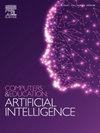AI-assisted audio-learning improves academic achievement through motivation and reading engagement
Q1 Social Sciences
Computers and Education Artificial Intelligence
Pub Date : 2024-12-25
DOI:10.1016/j.caeai.2024.100357
引用次数: 0
Abstract
Artificial intelligence (AI) is transforming education by enabling the creation of innovative learning resources that may cater to diverse learning needs. Students with common forms of neurodiversity, such as ADHD, often face unique challenges in higher education that are not adequately addressed by current educational resources. One potentially helpful resource is audio content, which provides a flexible and accessible supplement to traditional educational materials. While audio content, such as podcasts, is widely popular, its effect on academic achievement remains underexplored. This pre-registered randomized controlled trial investigated the impact of AI-assisted audio-learning modules on academic achievement, with a particular focus on the mediating roles of motivation and reading engagement. Results showed that the audio-learning modules increased student motivation and reading engagement. Importantly, audio-learning driven increases in motivation and reading engagement boosted academic achievement. Furthermore, students with greater ADHD symptom severity particularly benefited from the audio-learning modules, as they played a crucial role in determining course success. Together, this study highlights the potential of AI-assisted audio-learning modules as a valuable tool in digital education environments, catering to diverse learning needs and improving educational outcomes.
求助全文
约1分钟内获得全文
求助全文
来源期刊

Computers and Education Artificial Intelligence
Social Sciences-Education
CiteScore
16.80
自引率
0.00%
发文量
66
审稿时长
50 days
 求助内容:
求助内容: 应助结果提醒方式:
应助结果提醒方式:


